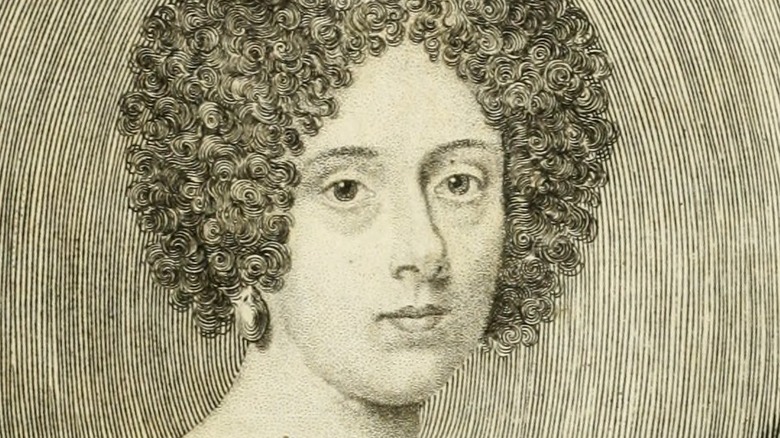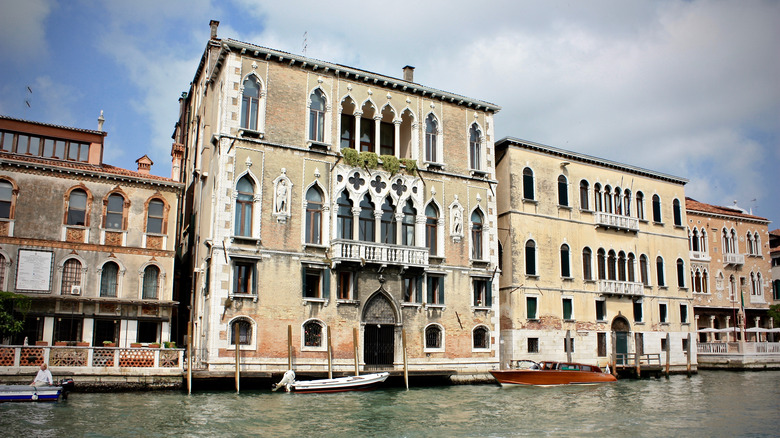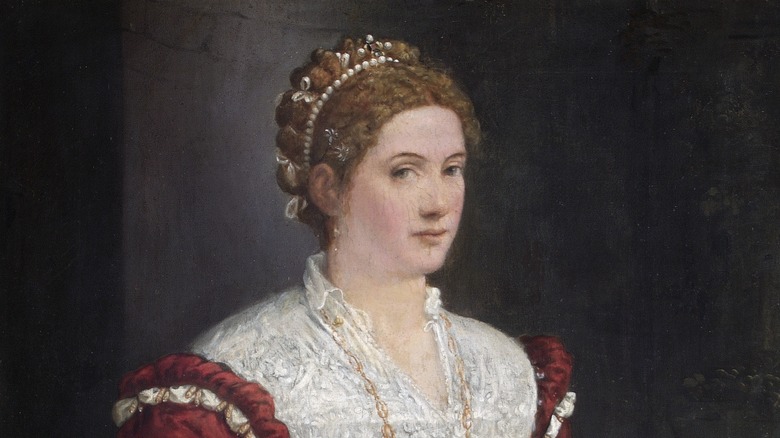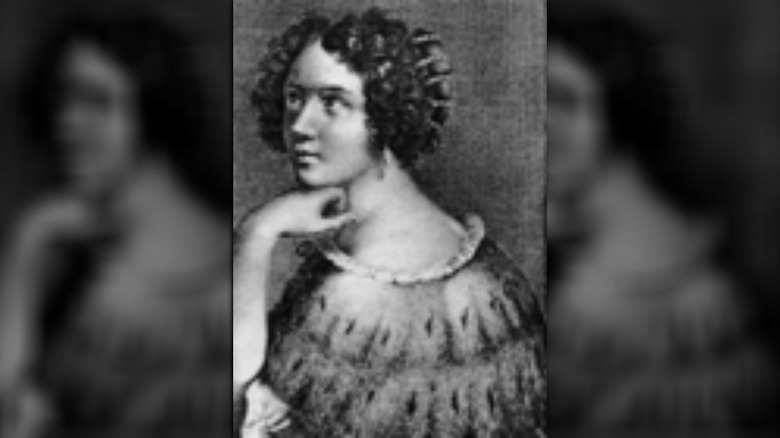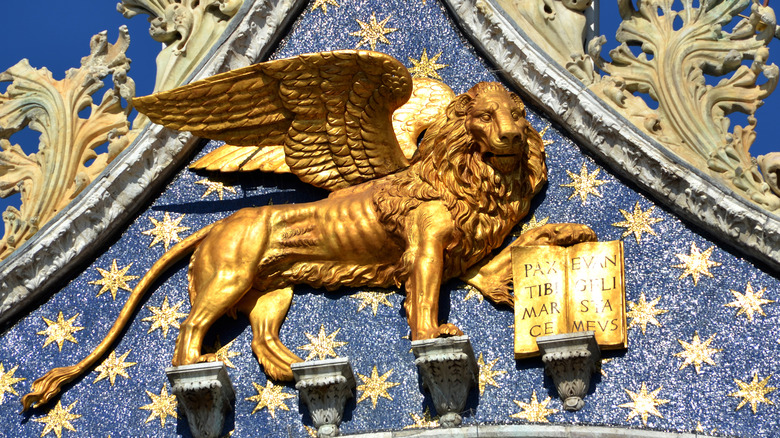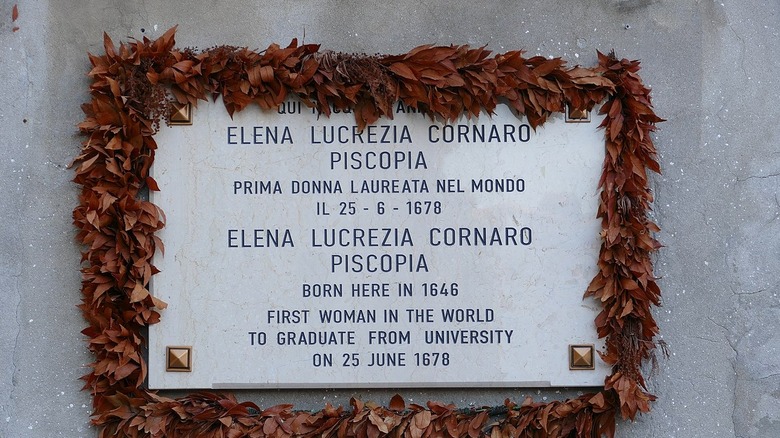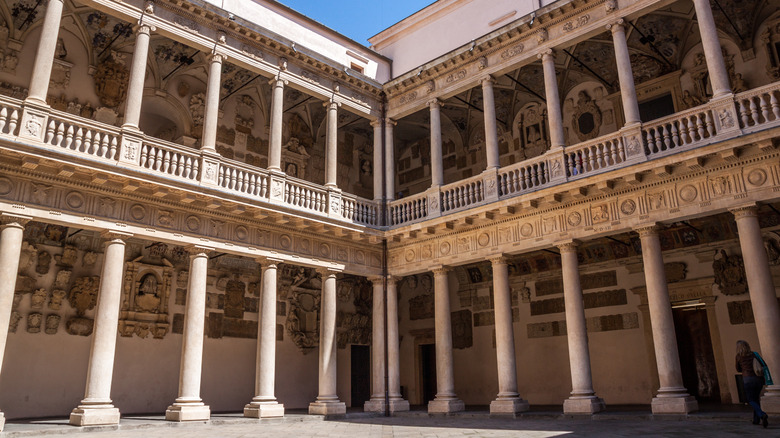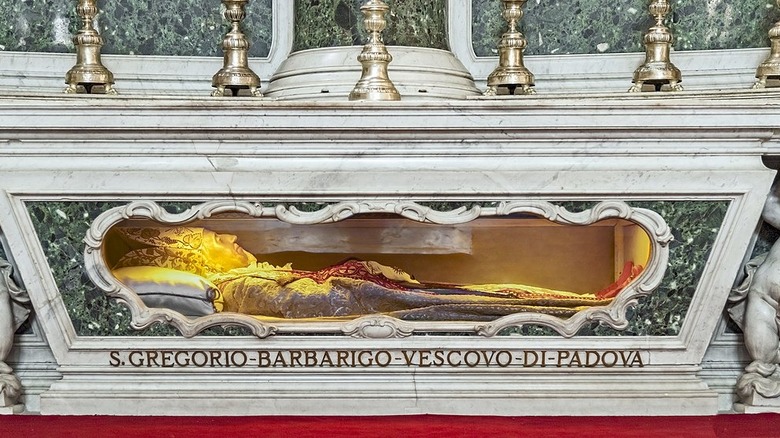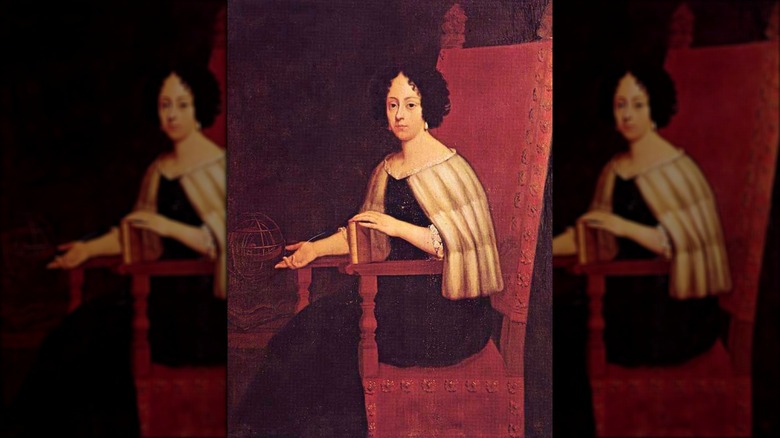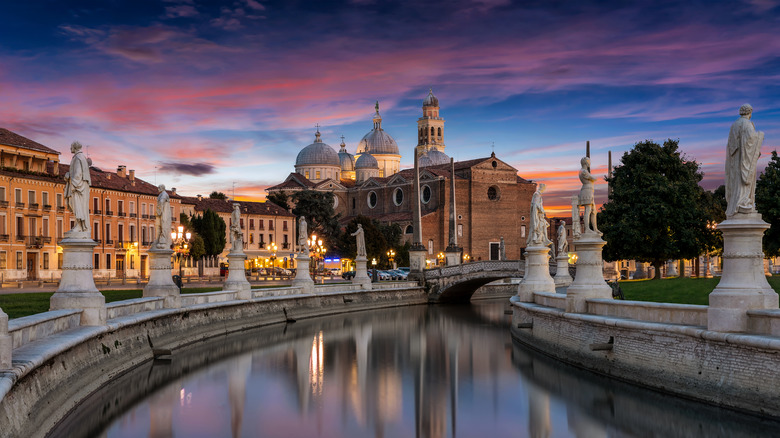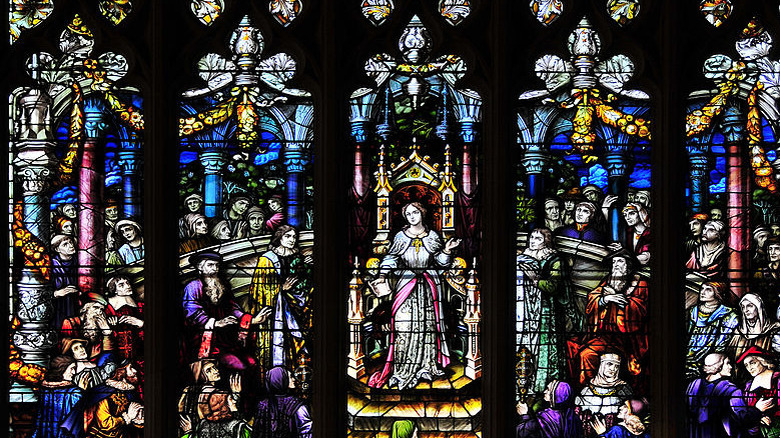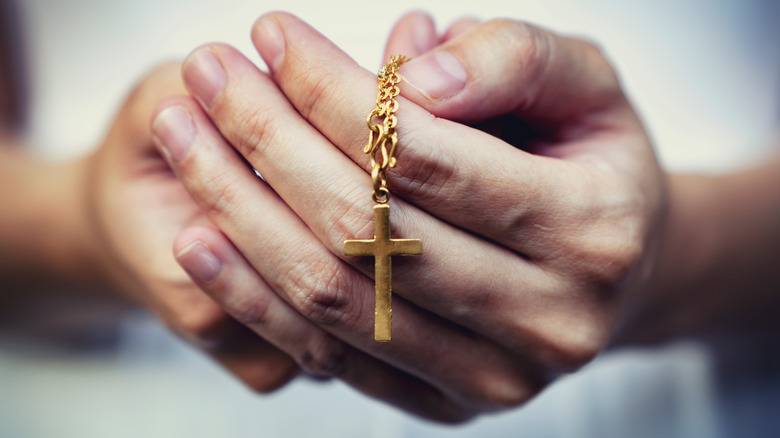The True Story Of The First Woman To Earn A PhD
A quick google search for "first woman Ph.D." will yield the names Mary Washburn or Helen Magill. Both of these women were among the first to earn degrees of doctors of philosophy in the 19th century. But they were not the very first — they were merely among the first in the United States. The first doctorates to be awarded to women went back much further, to the 17th century.
In 1678, a now-obscure and unknown Venetian noblewoman named Elena Cornaro Piscopia successfully defended her dissertation before a massive crowd at the Padua Cathedral to earn the first doctorate ever awarded to any female ever. But her story was not quite so straightforward. Despite her academic gifts, she was not driven to earn a doctorate for personal glory or to rock the establishment. But nevertheless, that one summer day in June, this 32-year-old woman did just that. She dazzled the world of European academia in a way that no one ever had, and perhaps ever will, writing her place in the history books. This is her amazing story.
An inauspicious birth
In the Renaissance, education was usually reserved for the nobility and the children of the wealthy. After all, hiring private tutors was expensive. But for Elena, an accident of birth meant that she would obtain an education despite being a member of Venice's common class on a technicality.
According to Britannica, Elena Lucrezia Cornaro Piscopia was born in 1646, the fifth child of a peasant girl named Zanetta Boni. This girl and her family had arrived in Venice, probably from Venice's Dalmatian domains in a time of pestilence or famine. In hard times, Venice provided opportunities for work, especially for a young Zanetta, who was able to rise well above her station through her relationship with Elena's father.
Despite her mother's social standing, Elena was born in the luxurious setting of the Palazzo Loredan in Venice (today the city hall). While her mother was a peasant, her father was none other than Gianbattista Cornaro Piscopia, procurator of St. Mark, second most powerful man in the Republic of Venice, and member of the aristocratic Cornaro (Ven. Corner) family. Zanetta had caught the eye of this nobleman, who took her as his mistress.
Elena's birth was problematic for two principal reasons. First and foremost, her parents were not married when she was born, so she technically had no legal rights to her father's name or property. Second, her parents' relationship was forbidden under Venetian law. Hence, Elena would legally be considered a commoner, despite her father's status. She was not allowed into Venice's "Golden Book" of nobility, a fact that would dog him until she was 18.
Destined for the academy
Elena was a true Cornaro. Although she was initially not allowed to use her father's name, she inherited a penchant for learning from her ancestors, several of whom were noted scholars. Her father was already well-known in literati circles for possessing one of the most expansive and well-stocked libraries in all of Venice. According to the Premio Elena Cornaro Society, he had a keen interest in physics and, alongside books and paintings, kept a small lab of sorts in the family palace. Her grandfather Giacomo Alvise Cornaro had been a correspondent of Galileo, while her relative Caterina Cornaro (pictured) had been the last queen of Cyprus in the 15th century. So as you can see, she had some big shoes to fill. And fill them she did.
Gianbattista Cornaro did not let his daughter's status get in the way of his plans for her. Noticing something special about Elena, he resolved to get her the best education money could buy. Early on, perhaps as early as age 4, she was enrolled in a difficult and challenging course of study that would baffle most children and educators today. She not only met the expectations, but crushed them.
The Venetian child prodigy
Elena Cornaro Piscopia was most likely a genius and was recognized as a prodigy in her youth. Her father set her up with a battery of teachers, and the results showed as early as age 7. According to Vassar College, she quickly became fluent in Spanish, French, Classical Greek, and Latin, no small achievement considering that the latter two languages were no longer spoken organically.
Elena also studied mathematics, the natural sciences, astronomy, and philosophy. Under Maddalena Capelli, she studied and composed music, mastering the harpsichord, clavichord, violin, and harp. Unfortunately, none of her pieces appear to have survived the ravages of time. According to Professor Monique Frize, Maddalena would remain Elena's good friend and confidant until her death in 1684.
Despite her excellence in virtually all subjects, Elena's true love was theology. Her study of the discipline provoked an interest in Hebrew (presumably for reading the Old Testament), leading her father to procure her a teacher from Venice's thriving Jewish community. According to the Premio Cornaro Society, Rabbi Shemel Aboaf taught her both Hebrew and Arabic, adding two Semitic languages to her repertoire. Together with her native Italian, she had mastered a grand total of seven languages (possibly eight if she spoke Venetian), earning her the title of "Oraculum Septilingue" ("Seven-Language Oracle"), as well as numerous other subjects that many struggle with today.
The celibate noblewoman of Venice
According to Prof. Monique Frize, when Elena was eight, her parents married after a 20-year relationship. The pairing caused a scandal in Venetian high society. Prof. Joanne Ferraro notes that marriage among the Venetian nobility was tightly regulated to conserve the wealth and status of the family. However, situations such as Elena's were not uncommon. The bigger issue was the status of their children.
The marriage made Elena and her siblings legitimate. However, as Prof. Frize notes, they were still barred from the privileges of the Venetian upper class. But money and power matter more than lineage, and the mercantile Republic of Venice was no exception. The republic needed money to fight its wars in the Adriatic and Eastern Mediterranean Seas, and Gianbattista was willing to provide it — in return for a favor. According to historian Francesco Maschietto (via Elizabeth King), after four petitions to the Venetian doge and the payment of the enormous sum of 105,000 gold ducats, Gianbattista succeeded in registering his children in Venice's Golden Book, the records of the republic's patrician families, in 1664.
Elena became a full member of the Cornaro family, afforded all the rights and privileges enjoyed by women of her lineage. She was an attractive match, and her father was eager to marry her off. But Elena had no interest in marriage. She wanted to become a nun and continue studying, but her father opposed. So, they compromised. She became a Benedictine oblate, living like a nun without being one. Thus, she was allowed to continue her career at the prestigious University of Padua.
Earning her reputation
It is easy to understand why Elena Cornaro Piscopia rejected marriage. She was already, at the tender age of 18, making waves in the academic world of Renaissance Italy. She was a celebrity in the academic world, invited to all sorts of symposia and academic conferences. Her gentle and graceful way of talking won her many admirers and even positions in academic societies of the day. According to the Premio Elena Cornaro Society, she was an honorary member of at least six different academic societies, including two in Rome, two in Venice, one in Siena, and one in Padua. According to Michele Battagia, she was even the head of one of these, the Accademia dei Pacifici in Venice.
By her mid-20s, Elena was already a superstar. Cardinals, nobles, the Venetian senate, and even kings corresponded and consulted her for guidance on academic questions from geometry to philosophy. Not bad, even by today's standards. In today's day and age, most would probably tell her to eschew the Ph.D. With such a CV, it would be a mere formality. But in her day, a doctorate accorded prestige to the holder and the family. Her father knew this, and if she was going to reject marriage, she would bring the Cornaro family fame in another manner: by being the first woman to earn a doctorate.
Into the academy
Seeing his daughter's talent for academic pursuits, Gianbattista Cornaro Piscopia urged his daughter to earn herself a doctorate. According to the Society for the Study of Women Philosophers, his beloved Elena deserved recognition, which would also bring the family prestige. So, he used his connections to allow her to apply to study at the prestigious University of Padua. For Elena, the University of Padua was familiar. Her philosophy teacher, Carlo Rinaldini, was a professor at the university and had dedicated a book to her in 1668. Combined with her stellar academic reputation and her piety, she already had one foot in the program's door.
In 1672, Elena was accepted to the university, where she studied philosophy and theology under Rinaldini and Felice Rotondi, respectively, according to "Encyclopedia of Women in the Renaissance." This move proved beneficial not just to her studies but to her health. Elena had always been frail, but for whatever reason, moving to Padua cured her illness. She took her classes and worked on preparing her thesis for a defense. In 1677, she applied to defend her thesis and graduate. There was just one problem: She had applied for a degree in theology. This brought her into direct conflict with the church authorities, who did not consider women eligible for this type of degree.
Bureaucracy delays her degree
When she applied for her degree, Elena Cornaro Piscopia faced no opposition from the university board. But the university chancellor, Cardinal Gregorio Barbarigo (pictured), had other ideas. The cardinal thought it ridiculous that a woman should be given a doctorate in theology. While this seems cruel and backward, the cardinal had a good reason for denying her. A doctorate of theology would technically have given Elena the right to preach and instruct in the faith. Since the Catholic Church's priesthood was (and is) all-male, she could not, according to the rules of the church, be given a doctorate in theology. Thus, Elena's position seemed uncertain. But her father would not allow his daughter to leave without that piece of paper.
After a flurry of letters between the cardinal, Elena, and Gianbattista, they arrived at a compromise. According to Agnes Scott College, since Elena had studied both theology and philosophy, she was technically eligible for both degrees. With this in mind, in 1678, Cardinal Barbarigo allowed her to defend her dissertation in philosophy and graduate with a laurea (the Italian equivalent of a doctorate at the time) in philosophy instead of Th.D. Elena agreed and prepared her defense. It would be one of the biggest days of her life and an occasion that would attract the best and brightest not just from Italy but from much of Europe.
The big day: Dr. Cornaro Piscopia
In 1678, Elena Cornaro Piscopia's dissertation defense came, the culmination of six long years of hard work. The defense was scheduled for June 25 at the university. According to Italy Magazine, though, 30,000 people, including academicians from all of Italy and members of the Venetian Senate, showed up, drawn by her reputation and eager to hear her presentation on Aristotle. Therefore, the defense had to be moved to the Padua Cathedral, a fitting setting for this devout theologian to make a small bit of history.
Defenses back then were not quite the formality they are now. First of all, unlike today, where Ph.D. candidates generally conduct their defenses in their vernacular languages, Elena's defense would be conducted entirely in Latin, the language of scholarship. For one hour, Elena gave her opinions on some difficult passages from Aristotle before facing the questioning of her three-man committee. She was able to answer all of their questions, dazzling the committee and the audience with her deep knowledge of her subjects.
Despite doubts, Elena had proven her detractors wrong. The committee's decision was usually made through a secret vote after private deliberations. Elena did not have the nerve-wracking experience of awaiting her fate. The committee and the audience were so impressed with her eloquent defense that she was awarded her degree by unanimous acclamation. That day, in the cathedral, Professor Rinaldi bestowed upon Elena her cape and ring and gave her a philosophy book. She was declared Magistrix et Doctorix in Philosophia, a teacher and a doctor in philosophy. Against all odds, she had earned a doctorate.
Elena Cornaro Piscopia's later life
After earning a degree, Elena Cornaro Piscopia resumed her quiet intellectual life, although her fame continued to follow her throughout Europe. According to Margaret Alic, she remained in Padua as an instructor in mathematics, although she was never given a professorship. The Premio Elena Cornaro Society notes that she also served as an examiner on committees, overseeing subsequent doctoral theses at the university. According to Oxford University, her correspondence continued, and in 1683, in celebration of the Polish victory over the Muslim Ottomans at Vienna, she reached out to the pope and Polish king Jan III Sobieski. Both responded to her. In France, her newfound fame earned her the attention of King Louis XIV, who ordered French scholars at the Sorbonne to seek her guidance and correspond with her on his behalf.
As her life wore on, Elena's health began to fail her. According to the University of Padua, as she aged, the stress of late-night study sessions, a frugal, ascetic lifestyle, and zealous work on behalf of the poor and sick began to show. She had frequent bouts with illness, and in 1684, tuberculosis, a scourge of the Renaissance world, finally claimed her life. She was only 38. Elena was buried in the Convent of Santa Giustina in her adopted home of Padua. Perhaps most sadly, she left behind both her father and mother, who would die in 1692 and 1697, respectively. Her father raised a monument in her honor, which today stands at the University of Padua.
Elena Cornaro Piscopia's legacy
Elena Cornaro Piscopia, according to Italy Magazine, was quickly forgotten after her death, despite the fame she had enjoyed in life. However, this was not due to a hatred for her. On the contrary, when Elena died, her funeral procession was attended by 37s academicians alongside a host of clergy and nobility. Venice itself virtually shut down in mourning for her. A 1688 collection of her works called "Opere" referred to her as having the piety of a virgin and being of admirable erudition. Even in death, she was still a beloved figure. The University of Padua even struck a medal commemorating her achievements in 1688. Hardly a treatment for someone who was ostracized.
Rather, it seems that Elena herself, ever the humble and devout ascetic, wished to be forgotten. According to the Encyclopedia of Women in the Renaissance, she asked her sister to destroy her work, which is very likely the reason why none of her music survives. Only about 30 works of different types and 30 letters survive, many of which were collected in the 1688 compendium. The 20th century has brought her back into public consciousness, though. She graces murals and stained-glass windows at the University of Pittsburgh and Vassar, respectively, and is held up as an icon for women in academia, particularly in science, even though it was not her primary focus.
Elena the Catholic
Today, Elena Cornaro Piscopia is seen primarily as a feminist icon for going against the order of the day. Her name is present on most lists of female pioneers in science and academia. But it is inaccurate to call her a feminist in the modern sense of the word. Elena was a devout Catholic all her life, taking a vow of chastity perhaps as early as 11. Her own words suggest that she wanted very little to do with the goings-on of the world. A beautiful poem, perhaps written in her final days, lamented the sinful nature of mankind and the world. The final stanza reads (via the Premio Elena Cornaro Society): "And yet, man is ungrateful to the Redeemer / He offends Him with sins at all hours / Oh, the evil fate of the human race! / it abandons life and runs to death!"
These words reflect Elena as a humble, pious woman who found joy in seclusion, study, and service, away from the evils and sins of the corrupt world. She never intended to be remembered as a heroine or pioneer as today, only as a lifelong lover of learning for its own sake. Otherwise, would she have had all of her works destroyed? Fortunately, some of her works have survived, allowing this brilliant and unique woman to claim her rightful place in history as a doctor and for her fellow Venetians, a quasi-saint.
